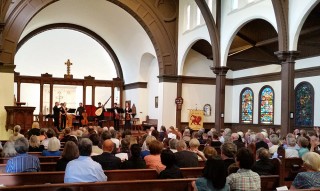Title

Under the direction of Robert Mealy, nine members of Juilliard415 performed music by Purcell, Muffatt, Corelli, and Lully at St. Mark's Episcopal Church in Berkeley as part of the Berkeley Early Music Festival.
(Photo by Benjamin Sosland)For a lifelong East Coaster who experiences both cognitive dissonance and acute jealousy toward the laid-back lifestyle of California, it’s easy to have fun with Berkeley stereotypes. Like the pizza place that claims your purchase will help stem the flow of human trafficking. Who knew that humanely raised, nitrate-free pepperoni could be so powerful? Or the parents whose favored means of conveying their (organic, free-trade) hemp-clad children—“Ophelia! Maddox! Finish your kombucha!”—appears to be some sort of bicycle/mobile home mash-up. Or the preternaturally perfect kale at the farmers’ markets that was cultivated with more care than most human beings are afforded.
Body
But just when the “Hey, dude” of it all threatens to send you scurrying back to the gritty streets of our fair city, you run into a place like the Musical Offering Cafe, which is devoted solely to classical music and where you can sip your cappuccino next to a life-sized cutout of Nicholas McGegan (who, as it happens, conducted Juilliard415 in one of its June concerts in Berkeley). Or you hear about a local public school that has the first, and perhaps only, Baroque orchestra for high school students in the country. (I don’t know about your high school, but lute lessons were definitely not on offer at mine.)
Juilliard415, which made its debut at the recently reinvigorated Berkeley Early Music Festival on June 8, appeared first under the always elegant direction of Robert Mealy. Nine recently graduated and current H.P. students offered a musical tour of Europe, circa 1680, with stops in Italy (Corelli), France (Lully), Austria by way of France (Muffat), and Germany (Rosenmüller). The audience received the performance warmly and our group played with polish, style, and commitment.
Three days later, a smaller selection of Juilliard players joined the wind and continuo sections of Philharmonia Baroque under the direction of McGegan, a frequent Juilliard guest conductor and the Energizer Bunny of early music. The Shakespeare-inspired program ranged from Purcell to lesser known works from the 18th century. As McGegan reminded the orchestra during rehearsal, “There’s no performing tradition to worry about if the last performance was in 1707.” The concert had some serious star turns for oboist David Dickey (MM ’16) and theorbo player Adam Cockerham, who’d just finished his first year. Both rose to the considerable challenges and fit right in alongside the much more experienced Philharmonia players.
As always in a festival environment, like minds come together. Harpsichordist Ignacio Prego (Graduate Diploma ’14) was featured in a solo recital at a concurrent harpsichord symposium, which was chaired by faculty member Peter Sykes. Violinist Laura Rubinstein-Salzedo (MM ’14) played in something like nine festival fringe concerts, sometimes joined by flutist David Ross (MM ’14). Oboe grad Brandon Labadie (MM ’13) helped produce an adjunct concert series sponsored by Early Music America. Meanwhile, incoming faculty member Elizabeth Blumenstock was given pride of place in multiple performances, and H.P. director Mealy, who is a Berkeley native and a local hero, was a headliner throughout the festival. Rachel Podger and Kristian Bezuidenhout—each of whom will lead New York performances with Juilliard415 this season—gave stunning solo and duo concerts. And with the support and sponsorship of Juilliard’s Alumni Office, we threw a festive reception that brought together several generations of Bay Area alumni and friends.
Overall, it was extremely gratifying for Juilliard to be presented on the mainstage along with some of the most accomplished international ensembles in early music, and it felt very much like another “first” to celebrate. It was equally nice to encounter so many of our grads and friends, and to see them making meaningful music together.
After having spent some time in Berkeley, it’s easy to see the appeal. While it’s not all roses and sunshine—the number of extremely down-at-the-heels street people is truly shocking— a particular version of the good life does seem to be thriving, for some at least, on the West Coast. Maybe it’s that fact that there’s not really a polarizing political argument in a place where everyone seems to be on the same side. (They were seriously Feelin’ the Bern there.) Or the keen awareness of the environment: don't even think about using a plastic bag. Or the occasionally confounding appreciation for civic engagement. (Favorite bumper sticker: “Intersectional Veganism or Go Home.” What does that even mean?
So while it’s in a way charming that people actually to wait for the green light to cross the street when there are no cars coming (don’t they have places to be?) it’s also enough to make an uptight New Yorker happy to be back and charging through the canyons of Manhattan. Without having to dodge quite so many Priuses.




